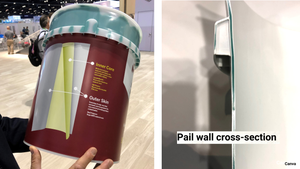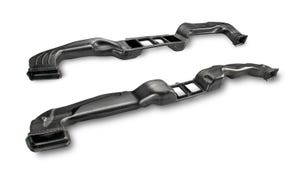Exit Strategies, Part 2:Preparing for sale by building company value
October 29, 2000
This article is the second in a series designed to help molders position themselves to build maximum value in their companies, leading to a possible sale. Our author is Debbie Douglas, managing director of the Douglas Group, a private investment banking firm that represents plastics company owners in the sale or purchase of businesses. Part 1 appeared in October.
Most owners of an injection molding company at some point contemplate the prospect of selling the firm—cashing in on years of hard work. When that day comes, it’s important that you and your employees have prepared the organization to extract maximum value at the time of sale. Theoretically, a well-run, well-organized, competitive injection molder is already doing most or all of the things that not only make good business sense, but also attract buyers willing to pay top dollar for such a lucrative enterprise.
But in the real world, not all molders are as lucrative as they could be, and not all molders are doing all of the things that attract the best buyers. In such cases, preparing for sale demands some organizational and financial upfront work to enhance the value of the company.
There are a number of things the owner of an injection molding company can and should do to build value in advance of the day when he may want to cash in. A complete list of possible moves to make would be a voluminous study, but the objective here is to give you just a handful of our favorite preparation steps to help increase value and position for success. What follows is our top five in the arsenal of value-enhancing techniques.
Build a Niche
The single most important technique, although often the least appreciated by the independent owner of a middle market company, is to build business focus around a specialization or niche. The idea of such focus is, in part, to gain operating advantage. The specialist tends to be competition resistant. It’s easier to market and build reputation in a narrowly focused subsegment. Margins are often higher in the narrower niche areas as commodity competition is minimized.
In addition to real operating advantage, there is also a value perception in the eye of the buyer. A great many buyers would rather own the top performer in a small niche segment than the “also ran” in a wide commodity product channel.
Often, by starting several years in advance, it’s possible to position the business by focusing sales efforts toward specific channels, and invest new product and process development efforts to nourish a particular type of growth. Specialization can be built around an end market, or subsegment of an end market, or it can be built around a process, whether it’s gas assist, coinjection, vertical insert molding, or metal molding.
Reduce Owner Dependency
Every business buyer knows that the selling owner is likely to be far less interested and concerned about his business after he gives up his ownership interest. In some cases, that may mean that the owner retires and moves to Tahiti. In others, the owner may remain with the company, but, realistically, he is not likely to work with quite the same intensity or devotion as before. In either case, the buyer will need to assess how the company will fare without him.
It’s in the seller’s best interest to groom successors who will maintain, if not enhance, the company’s value. Questions to ask yourself: Is there second tier management in place with the experience to run the show? Will customers feel secure without the exiting owner, and will they stay? Does the exiting owner fill any primary roles for the company, perhaps in engineering or design, that might be sorely missed or hard to replace if he leaves? All of these questions invariably will be considered by buyers.
The prudent owner begins years ahead to develop talented second tier management—ahead of his needs. Ideally, he works himself out of a job. The more self-sufficient and independent the company becomes, without need for constant owner input or intervention, the more valuable that business enterprise is.
Gather Market Intelligence
Gathering market intelligence should be an ongoing task to add value for potential sale and to stay alert to competitive change. Many owners think they are gathering market intelligence by simply capturing and collecting all of the cold letters sent to them by miscellaneous would-be buyers. It’s true that someday you will in fact want to know who your best buyers could be. Unfortunately, however, most of the best buyers will not be in your “save the letter” file. First of all, most cold call inquiries come from business brokers trolling for clients. Second, cold call inquiries from real buyers don’t usually represent the best buyers. The buyer who routinely cold calls prospective targets is typically a seasoned bargain hunter.
If the “file” isn’t worthwhile market intelligence, what is? We generally look for three types of market intelligence when we begin a new seller analysis:
Information about recent sale transactions, including who bought whom, and why, and for how much.
Competitive position of our client seller, including market size, market share, comparative profitability, and growth rate relative to the market.
Big picture trends within a client’s industry subsegment or customer niche.
Such information can be gleaned from reading trade publications and business periodicals, by talking with other business owners (take notes), and by teaching your staff to remain alert for and report back on any industry intelligence they might gather. Track these things steadily as you go and you will not only benefit at the time of sale, but you will also gain valuable competitive insights along the way.
SWOT Analysis
One of our favorite planning tools, the SWOT analysis, is also an excellent tool for merger and acquisition decision making. The SWOT acronym stands for strengths, weaknesses, opportunities, and threats.
It’s an exercise performed internally that forces business managers to look forward and think about the future in terms of possibilities. It’s very similar to the type of analysis that naturally occurs during any buyer assessment. Reviewing your competitive position in the marketplace and building a focused strategy to enhance future potential and minimize risk can have a big payoff. It can help you to operate more effectively and can clearly facilitate your ready answers to the hard questions buyers will ask at the time of sale.
Housekeeping
In preparing to sell well, there is a good deal of housekeeping that should also be considered in advance. We define housekeeping as the little things that are fairly mechanical and simple to do, but which are often neglected for many years at a time. The following is a simple checklist:
Two years or more before sale:
Write off old assets of questionable value; do this in one single adjustment (separate and distinctly identifiable for buyers).
Establish noncompete contract standards for key employees.
Develop a long-term capital equipment plan to avoid the outdated equipment crisis at the time of sale.
Minimize debt.
One year before sale:
Get clean audited or reviewed financial statements from a qualified CPA.
Check corporate minutes and shareholder records to be sure all are current and in good form.
Check all patents and copyright registrations to be sure everything is up to date.
Three months before sale:
Clean house physically, at primary operating locations.
Consider face lift cosmetics to spruce up physical plant, particularly trouble spots.
Run a lien check and a Dun & Bradstreet credit report to review records that others will see about your company.
Consider asset and real property appraisals.
These are just a few suggestions for preparing your company to achieve long-term optimum value. Next month we’ll explore the selling process itself, and how to handle it successfully.
Contact information |
You May Also Like


